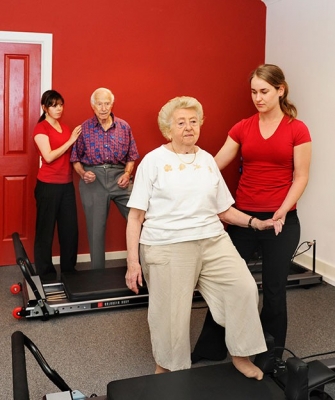Pilates for Elderly and Weight Management. Article by Margarita Gurevich as featured on Russian SBS Radio Broadcasting "Advice from Physiotherapist".

Health Care for Elderly
In our previous broadcasting we talked about Clinical Pilates for children and Clinical Pilates during pregnancy. Today we will discuss Clinical Pilates for elderly and also special weight management programs.
Unfortunately as people get older they often become less active which increases the risk of certain diseases. This is why Clinical Pilates can be very effective for older people. Doing Clinical Pilates regularly can assist with your breathing and improve your posture, general muscle strength, balance and coordination. It is well known that as people age their risk of falls increases which can lead to fractures. The healing process can also take longer for an elderly person. It is therefore very important to try to reduce the risk of this happening as much as possible. The stronger a person is, the better his balance and coordination, the lower the risk of falls. Special exercise aimed not only at improving the muscle strength but also balance and coordination can greatly assist with this. Clinical Pilates for elderly is a program which is run specifically for this purpose.
Regular physical exercise can also reduce the pain associated with a number of musculoskeletal conditions, such as osteoarthritis and rheumatoid arthritis, fibromyalgia and others. Exercise also helps to prevent a number of cardiovascular diseases and metabolic disorders such as diabetes and obesity. Many of our patients have often told us that they try to maintain a healthy diet, not eat fried or fatty foods and yet still gain weight. Often this happens as a result of insufficient physical exercise. It’s important to note, however, that elderly people must exercise in a safe environment, under strict supervision of a physiotherapist and ideally in a one to one setting. It’s also very important to undergo a full body diagnostic assessment first in order to make sure that the Clinical Pilates program will meet the specific needs of the individual.
As for weight management programs – their ultimate goal is to help a person attain and maintain a healthy weight. Many people associate weight control programs with weight loss, but this is not necessarily true as sometimes in order to reach a healthy weight a person needs to gain, rather than lose, weight. The program should therefore be based on the following two principles: attaining healthy weight as a result of weight reduction (for conditions such as obesity) or, on the contrary, weight gain (when weight is at a level below normal) and then maintenance of this healthy weight.
Let’s first of all focus on the first scenario – where a person needs to lose weight first and then maintain it. For starters we need to point out that quick fad diets are not the answer. Most of these diets are quite extreme and even if a person does manage to quickly lose the desired weight chances are that he/she will gain that weight back just as quickly. It is therefore much more beneficial to make small lifestyle changes to reach that goal. This includes maintaining a healthy diet in conjunction with regular physical exercise. This will boost the metabolism, aiding the absorption of essential nutrients from the food. Improved metabolism will subsequently help reduce the risk of excessive weight gain and lead to a better body shape.
When it comes to the second scenario, where an individual needs to gain weight, the same formula should be followed. A healthy diet and regular physical exercise will help gain muscle bulk which in turn will lead to overall weight gain and a better body shape. This way the weight gain will be healthy.
The main components which should be included in weight management programs are Clinical Pilates, specialised home exercise programs, balneotherapy, and, where necessary, electrotherapy as well as dietary advise. In some instances the combination of a healthy diet and exercise will be sufficient but in some cases other treatment modalities will be required.
Needless to say such programs should only be run by trained health professionals. Once again we would like to remind you that it’s important to undergo a full body diagnostic assessment first.
